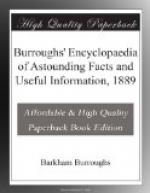An advertiser should not be discouraged too soon. Returns are often slow and inadequate. Time is required to familiarize the public with a new article or new name. Some men have given up in despair, when just on the eve of reaping a harvest of success by this means. Many of the most prosperous and wealthy business men in this country have at times been driven hard to meet their advertising bills, but they knew that this was their most productive outlay, and by persistently continuing it they weathered the storm.
NEWSPAPER ADVERTISING.
Select the newspaper which circulates among the class of persons desired to reach. Do not advertise a special article or business designed for a limited class of customers, in a general newspaper. Almost all trades and occupations in these latter days have their special journals, and these afford the best means of reaching that class of persons. The purpose of the advertiser then should be to discover, first, the character of a paper’s circulation, and second, the extent of its circulation. On these two essentials may then be based an estimate of its value as an advertising medium. The character of a paper’s circulation is easily determined by the quality of the reading matter which the paper contains, and the general tone imparted to it by its conductors. The extent of a paper’s circulation bears chiefly on the rates of advertising, which, other things being equal, should have a direct ratio to it. The extent of circulation is a matter of almost constant misrepresentation on the part of publishers or their agents.
As a rule, the most prominent and costly part of the paper is the best. In country weeklies the “local items,” or next to them, is preferable. In city journals containing a large amount of reading matter, a well displayed advertisement on the outside pages is perhaps the best for most classes of business.
Place the advertisement before the public at the proper time, just when people are beginning to feel the need of such as the article advertised, as furs, when winter sets in. An advertisement may, however, profitably be kept before the public constantly, and increased or diminished as occasion requires.
CIRCULARS.
There are many well established firms who will not advertise in the newspapers at all. They believe that the same amount of money spent in circulars, catalogues, etc., sent direct to the persons whom they desire to reach, pays better than newspaper advertising. This is more direct, and affords the advertiser the opportunity of setting forth his claims more fully. Circulars, cards, catalogues, etc., also afford a means for the display of taste in their typographical arrangement and appearance, and often times this has as much to do in making an impression on the person who receives it, as the reading matter contained therein.




